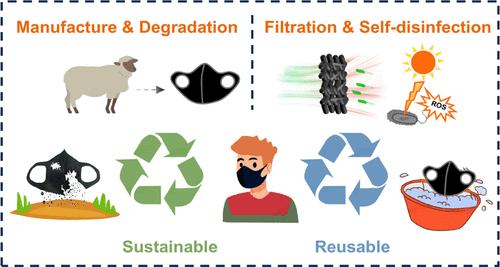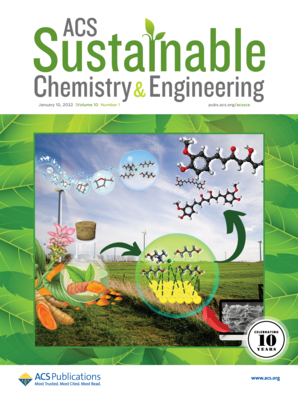Photocatalysis-Induced Self-Disinfecting Collagen Fiber Networks for Reusable and Sustainable Masks
IF 7.3
1区 化学
Q1 CHEMISTRY, MULTIDISCIPLINARY
引用次数: 0
Abstract
Respiratory infectious diseases pose a serious threat to public health, and the use of masks is one of the most effective measures for protecting humans from airborne pathogens. Most commercial masks lack self-disinfection and are not biodegradable. This creates significant challenges for reuse and sustainability. We have developed a natural collagen fiber network (CFN) with hierarchical fibrous structure as an alternative air-purifying fabric for manufacturing sustainable masks. However, its protein composition makes it highly susceptible to microbial contamination, significantly limiting its practical application. To address this issue, we employed an in situ synthesis method to load tannic/ferric (TA/Fe) aggregates onto the surface of collagen fibers in this study. The resulting CFN fabrics exhibit strong photocatalytic activity, generating reactive oxygen species under light and achieving a 99.99% bactericidal rate within 5 min of irradiation. Additionally, the photocatalytically induced self-disinfection of the prepared TA/Fe@CFN (TFC) exhibits excellent long-term stability. It maintains high aerosol capture efficiency (>99.92%) and strong antibacterial performance (>98.26%) even after 50 washing cycles. Importantly, the TFC fabric is derived from cost-effective and renewable animal hide, making it ideal for large-scale use in sustainable personal protective equipment. Additionally, the used TFC fabric can fully degrade under landfill conditions within three months. This study presents a reusable, sustainable, and high-performance alternative to conventional synthetic mask fabrics, with potential applications in the fabrication of functional textiles.

光催化诱导的可重复使用和可持续口罩的自消毒胶原纤维网络
呼吸道传染病对公众健康构成严重威胁,使用口罩是保护人类免受空气传播病原体感染的最有效措施之一。大多数商业口罩缺乏自我消毒,不能生物降解。这给再利用和可持续性带来了重大挑战。我们开发了一种具有分层纤维结构的天然胶原纤维网络(CFN),作为制造可持续口罩的替代空气净化织物。然而,其蛋白质组成使其极易受到微生物污染,极大地限制了其实际应用。为了解决这个问题,我们在本研究中采用原位合成方法将单宁/铁(TA/Fe)聚集体加载到胶原纤维表面。所得到的CFN织物具有很强的光催化活性,在光照下产生活性氧,并在照射5分钟内达到99.99%的杀菌率。此外,制备的TA/Fe@CFN (TFC)的光催化诱导自消毒表现出优异的长期稳定性。即使经过50次洗涤循环,仍能保持高的气溶胶捕获效率(>99.92%)和强抗菌性能(>98.26%)。重要的是,TFC面料来源于具有成本效益和可再生的动物皮革,使其成为大规模使用可持续个人防护装备的理想选择。此外,使用过的TFC织物在填埋条件下可以在三个月内完全降解。本研究提出了一种可重复使用的、可持续的、高性能的传统合成面具织物替代品,在功能性纺织品的制造中具有潜在的应用前景。
本文章由计算机程序翻译,如有差异,请以英文原文为准。
求助全文
约1分钟内获得全文
求助全文
来源期刊

ACS Sustainable Chemistry & Engineering
CHEMISTRY, MULTIDISCIPLINARY-ENGINEERING, CHEMICAL
CiteScore
13.80
自引率
4.80%
发文量
1470
审稿时长
1.7 months
期刊介绍:
ACS Sustainable Chemistry & Engineering is a prestigious weekly peer-reviewed scientific journal published by the American Chemical Society. Dedicated to advancing the principles of green chemistry and green engineering, it covers a wide array of research topics including green chemistry, green engineering, biomass, alternative energy, and life cycle assessment.
The journal welcomes submissions in various formats, including Letters, Articles, Features, and Perspectives (Reviews), that address the challenges of sustainability in the chemical enterprise and contribute to the advancement of sustainable practices. Join us in shaping the future of sustainable chemistry and engineering.
 求助内容:
求助内容: 应助结果提醒方式:
应助结果提醒方式:


